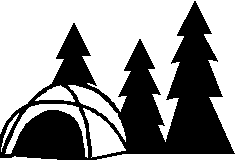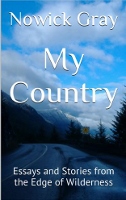HyperLife:
A Life in Hypertext
Of Ducks, Trucks and Bucks
When I dropped out of the rat race I was after something more than the endless pursuit of money, the constant echo of bucks, bucks, bucks. I was lured by another dream, the grail of rural self-sufficiency. Not that I was ever granted the whole utopian vision, mind you--just glimmerings of a life lived closer to nature. There was always, of course, the problem of making that living, of financing the dream.
I don't need to take up space here describing the urban/suburban treadmill or the environmental, social and psychological messes created by modern civilization. Just read the daily news. By the age of twenty-one I knew enough to start looking for something better.
I jumped cold-turkey from the hothouse of academia into the granitic soil of New Hampshire, one of North America's most economically depressed areas. Land was cheap because the former generations of farmers had given up and moved on. A fellow ex-student had sunk his borrowed fortune into a large chunk of wooded hillside for a cooperative homesteading venture and was seeking willing bodies to help flesh out his vision. I came full of theories about gypsy economics, constructive anarchism and apocalyptic survival. But I had no money, no useful trade.
I took a job on the district highway crew, manning the street sweeper unit which the old boys dragged over the undulating roads of the county, and which spewed road grime over me, head to toe, for $2.17 per. I drove to work in a yellow lemon of a Karman-Ghia that I bought from a fourteen-year-old boy for $140. It was my first car. It worked fine until I decided to treat it to a quart of high-quality detergent oil. The detergent action dissolved whatever carbonaceous glop was holding the pistons together and the car promptly died. It was a sign. As were the eleven days and nights of rain that dismal spring, that I counted off like Noah watching the end of the world.
On day twelve I left my drenched dreams behind and took off for California with thirty dollars in my pocket and another gleam in my eye: the riches to be made in the sunny, booming West. I figured that with a big bank account, I could better cushion the rocky landing on my next sojourn back to the earth. But the California cities, I found, were not made of gold.
After two years of odd jobs as an unskilled urban laborer--housepainter, clerk, gas jockey, parking valet--I dreamed up a new way to get back to nature. On the inside track, so to speak. I would go back to my books and find nature in literature. The bonus would be a paying job, a career as a teacher. And I might even find a nice pastoral place to settle down. According to this latest conception, nature was mostly a state of mind, an aesthetic quality of life; and so "self-sufficiency" was confined to the status of financial equilibrium.
Drawn by the compelling beauty of the rugged Northwest, I came to British Columbia for more university study. The setting proved apt for delving into the rich natural resources of Canadian Literature--an entity which, until registration, I didn't know existed. Upon graduating two years later, I discovered that a Master's degree in English is worth exactly as much as the paper spelling it out. But I finally landed a job in the midst of a nature more vast and remote, yet also more human, than I had yet imagined.
I was hired by the school board of Northern Quebec to teach junior high students in an Inuit village. I ended up learning more than I taught. In that wild, white world the people had no ducks, few trucks, and fewer bucks. What they did have was an attitude, a history, a culture based on living with nature, in nature, of nature. I would not, however, describe them as "primitive." Their own nature was warm, friendly, infinitely patient and optimistic--and above all, adaptable. Their history is full of change, of using what practical things come to hand--from whalebone, to steel knives, to flour and tea, to rifles and snowmobiles, to aircraft and development corporations. With every innovation comes a compromise with a former, "more natural" way of life. The Inuit are no longer self-sufficient, in material terms. Yet in bearing, in outlook, in grounding in the matter of survival in an always challenging environment, they are supremely self-reliant. I learned that when I saw the hunters using knives to operate on skidoos in open-air surgery at forty below in the middle of nowhere.
I left the North with a new appreciation of what it means to live on the land, with renewed resolve to try it myself, and with the capital required to begin. I bought a share of a land co-op in the interior mountains of B.C. and started carving a homestead out of the bush.
My skills in the basics of rural living were still negligible. Tapping neighbors for help and advice, I cleared a driveway and laid a waterline; cleared space for a garden, orchard and house; built a woodshed and temporary chicken coop number one. Then came housebuilding--a project which would take seven years.
For the first three years I paid little attention to schemes for making money. When my savings account finally ran dry, I had to start hustling. There were a few useful trades I'd learned by experience, and some others to learn from scratch. I hired myself out as a carpenter, stonemason, firefighter, treeplanter.
In the meantime I was joined by two other people at home--Sarah, and a baby daughter. Now money earned meant time spent away from family as well as from the lagging house construction. I began to look closer at ways to work at home: both to generate income and to produce what I would otherwise buy.
Short of pure self-sufficiency, I've found instead a place in a fabric of interdependence. It seems neither possible nor desirable to produce every food, every tool here--either on the homestead, or in the nearby community. Barter, home business, homestead production, paying jobs all play a part. It is efficient to grow all one's vegetables, plus extra garlic, and then to sell the garlic and buy grain, which is not so easy to grow here. Another example: Sarah has designed box labels in exchange for the products they advertise--apples and a kitchen stool. And after gaining experience building rock walls for our own house, we were both hired to build a planter for a local artist who'd received a bed-full of lilies in trade for a painting.
Sometimes the tradeoffs are inefficient, sometimes unexpected. Take the case of the ducks. We ordered ducklings from a distant supplier to raise for eggs, manure, and slug-control. Instead of being shipped direct as arranged, they had to be rescued from town, two hours away. I drove, let's see, truck number four (we've gone through six), and on that trip the transmission disintegrated, losing its last gear at the foot of the driveway. The ducks lived on to trample the garden, before succumbing to hawks. Then there's the story of the donkey we bought to save on truck use. Several months later we watched in complete surprise as she gave birth. The next year we recovered mama's original cost by selling the young jenny--or rather, trading her, for two ducks, some truck repairs, and a bit of cash.
Living on the land doesn't usually pay well, but then it's more than an occupation. It's a relationship with the natural world. It takes a commitment to a lowered level of consumption which can only help in reducing the total human impact on the fragile planet. The learning process goes on, gradual and endless. If the homestead books don't yet balance, I'll keep on tinkering with the equation, seeking the right combination of ducks, trucks and bucks, keeping the larger balance at heart.
© Nowick Gray
---originally published in NeWest Review, summer 1989, and reprinted in Inside Essays 2 (ed. Doug Hilker, HBJ, 1992)
Stories - in rough chronology
The Baby Boom
The Boys in the Park
First Love
Youth
Trumped in Peckerdom
Of Ducks, Trucks and Bucks
Stephen King through Rose-colored Eyes
Just Coyotes
The Meaning of Life
Deep SummerMy Generation: A Memoir of the Baby Boom
Prefaces and Introductions . . . without end
Ebook Downloads:
Fiction and Creative Nonfiction by Nowick GrayVisit author website: nowickgray.com
Follow Nowick Gray on Facebook

.jpg)
.jpg)
